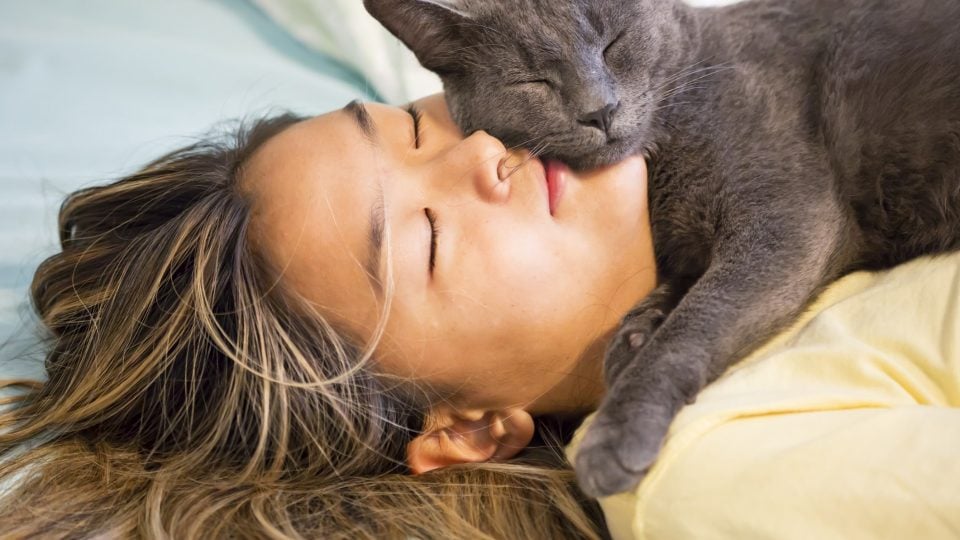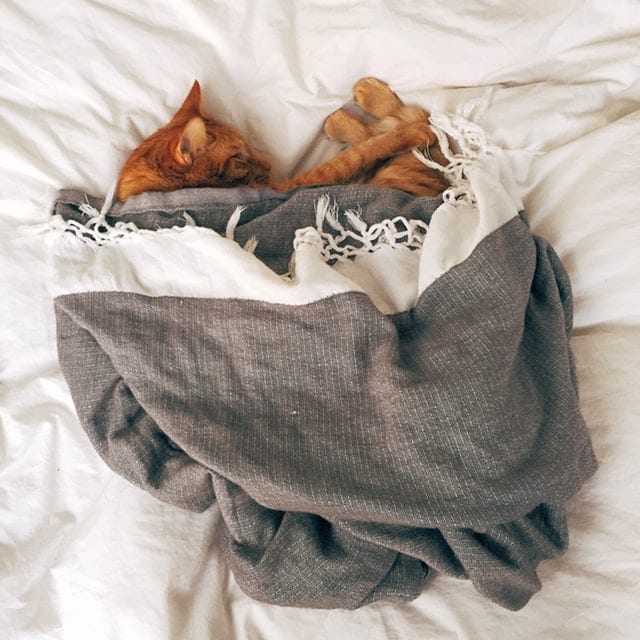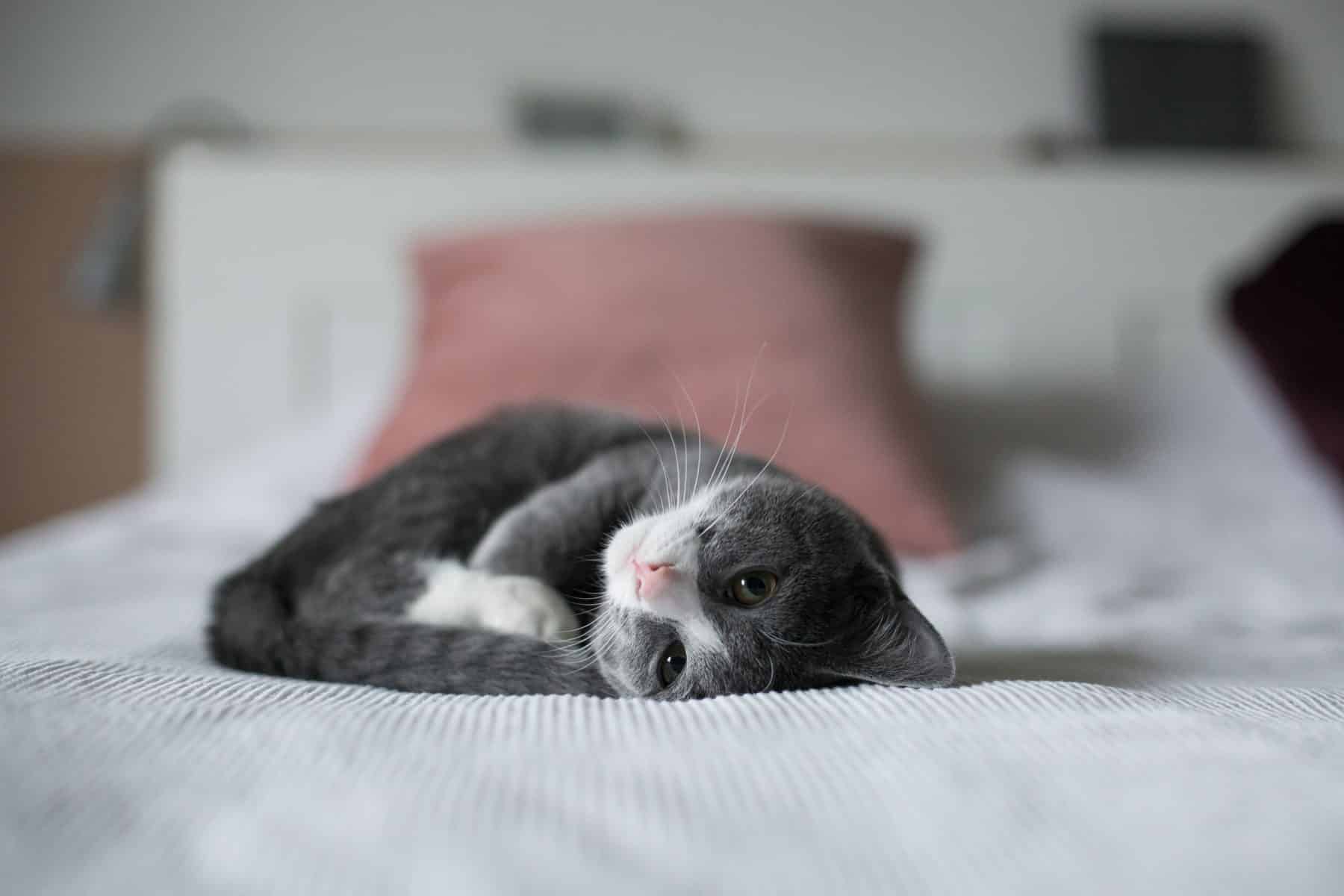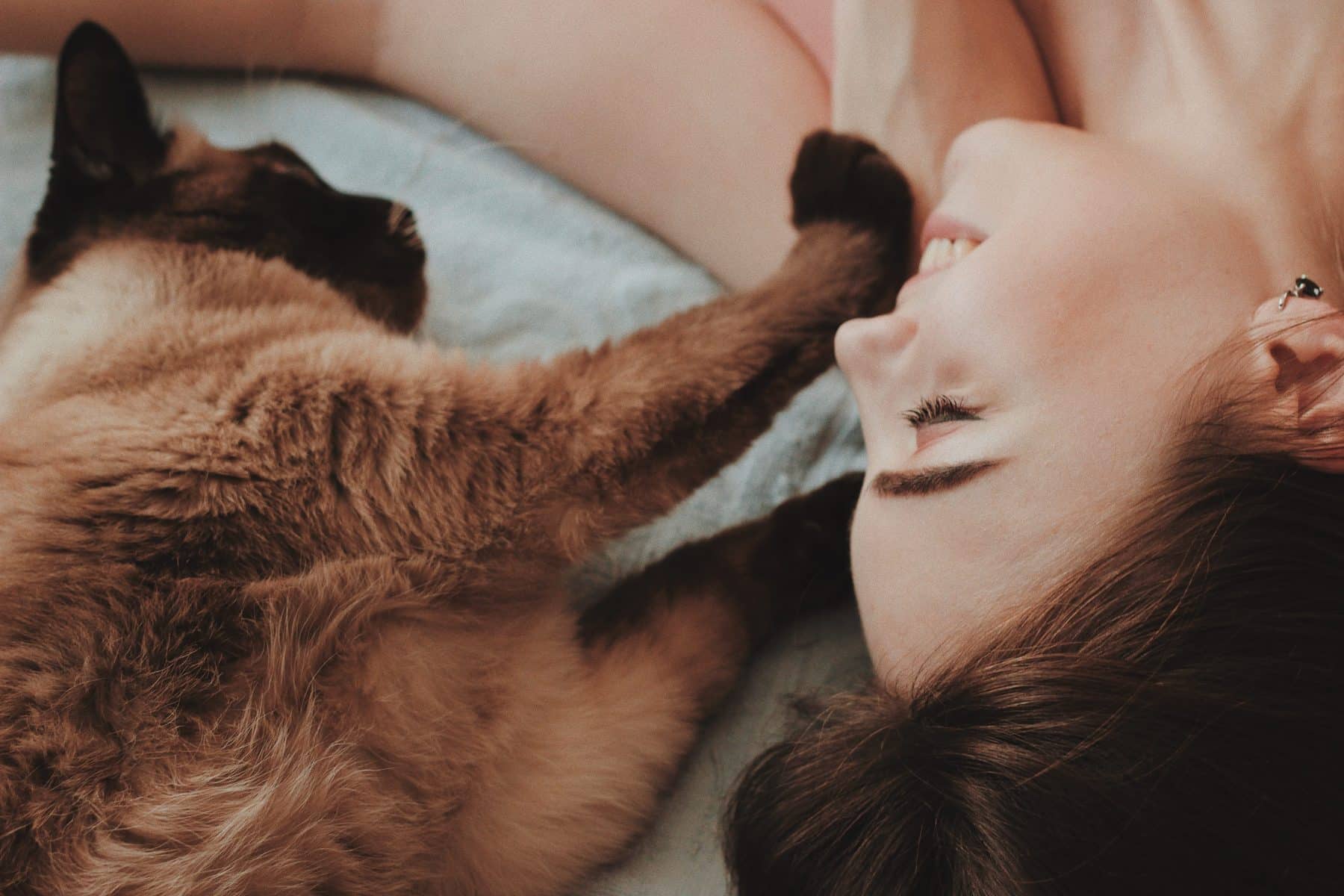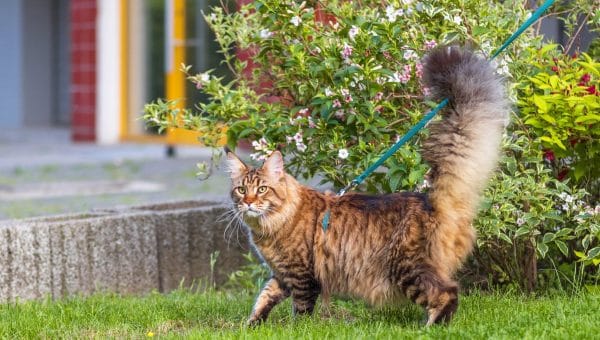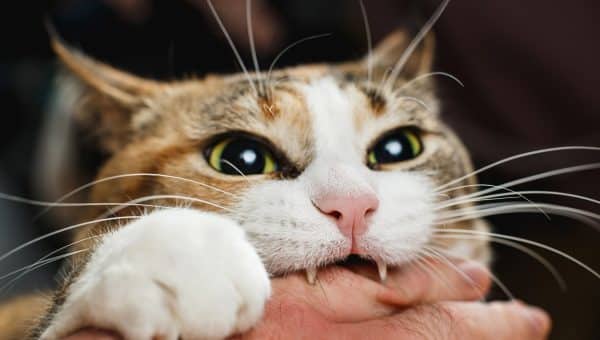- Not a substitute for professional veterinary help.
For cat owners it’s a familiar scene: you’re in your jammies, you’ve finally gotten into the optimal position for sleep, and here comes the family cat to join you. A brief scan of the area is all he needs to determine that your face is the perfect place to park his furry tush.
What gives?!
You’ve given your cat a cozy bed, perches, and the whole rest of your house to slumber in. With all those options, why does your cat still sleep on you?
Cats are creatures of mystery, but there are several theories why cats enjoy sleeping on us.
5 Reasons Your Cat Sleeps on You
1. They’re seeking warmth
Ever notice how your cat seeks out a heat source when he’s ready for his midday siesta? Perhaps you’ve found him cozied up next to the radiator or burrowed in a pile of laundry.
Simply put—cats like it warm.
A cat’s normal temperature falls around 102 degrees Fahrenheit, according to PetMD. By snuggling up to you, they’re able to maintain that temperature without much effort. This explains why cats like to snooze in sunny windows or crammed into boxes. When it comes to sleep, warmth is more important than comfort for cats.
2. They’re marking their territory
PetMD also points out that cats are territorial creatures. They claim their turf by marking it with their scent. So when they sleep on top of you, they’re actually marking you—and your bed—as theirs. We should be flattered by this behavior, apparently.
3. Cats look for security
In the wild, a cat will seek the safest place to rest in between hunts. In the home, that place is with you.
“Cats are typically at the top of the food chain, but even still, they have to keep a watchful eye out for danger,” explains Dr. Zay Satchu, the Chief Veterinary Officer at Bond Vet in NYC. “Being around their humans, they can rest easier knowing there is some safety there.”
Sleep is a vulnerable time, so your cat is indicating that he trusts you and feels content and secure with you. This behavior begins in kittenhood.
“Cats are raised in litters, and when they’re very young until they’re about 12 weeks of age, sleeping usually means piling onto one another near mom,” says Dr. Satchu. “It’s how they are raised during their peak socialization weeks and similar to other things they learn during this time, this translates into lifelong habits.”
Your cat sleeps with you for comfort and security. After their mother, you’re the next best thing.
4. It’s a bonding exercise
Cats have earned an unfair reputation as being aloof and unfriendly. But as cat owners, we know this couldn’t be farther from the truth. Our cats are as affectionate as they are social. They want to bond with us.
Cat behavior consultant Mikel Delgado, PhD, told Catster that it’s not unusual for cats to engage in “pillowing” at bedtime. This is when they use another cat as a pillow (adorable!) If they’re the only cat in the house, they love to use you as an alternative.
This tactile component to the feline/human bond is your cat’s way of saying, “I love you. I want to be near you and spend time with you.”
It’s hard to argue with that.
5. It may be hormonal
Research has shown that dogs release the feel-good hormone oxytocin when they’re in contact with their owners. According to VetStreet, it’s unclear if this applies to cats as well. But it’s not a farfetched theory.
Why Do Cats Prefer Sleeping On a Specific Body Part?
Does your cat prefer to snooze on one specific part of your body? Here are some possible explanations.
Your cat prefers to sleep on your head
There may actually be a few reasons that cats like to sleep on your head.
- Your head is warm. Your head releases steady heat throughout the night, making your pillow an attractive place for your cat to hit the hay.
- Your head is (mostly) stationary. Restless sleeper? To avoid being jostled all night by your restless arms and legs, a cat will gravitate towards your head.
- It smells good. Your cat may like the scent of your hair and shampoo. Cats have a stronger sense of smell than we do, and they’re drawn to the comfort of your scent.
Your cat prefers to sleep on your chest
A second popular spot for your cat to sleep is your chest. One explanation for this is that a cat may be drawn to the sounds of your body. They may lay on your chest because they’re comforted by the sounds of your rhythmic heartbeat and your steady breath.
Dr. Satchu confirms this theory. “Cats likely find some benefit to our very slow and calm respiratory patterns while we sleep,” she says. This is when we are at our most calm and most cats tend to echo those same sentiments, even though they get to sleep for a good 18 hours each day!”
Your cat prefers to sleep in your lap
Even when you’re not in bed, most cats enjoy curling up for a nap in their owner’s lap. Not only is it’s warm, but it’s also the perfect spot to receive some extra petting.
Why Cats Sleep with Their Back Towards Us
Some cat owners are miffed by this behavior. But your cat isn’t being rude. He’s showing trust.
As the cat behavior expert and best-selling author Pam Johnson-Bennett puts it: “Since a cat is an animal that is both predator and prey, he wants to position himself in the safest place. If he turns his back on you as he settles down, he’s showing he trusts you and maybe even that he’s going to watch the environment for both of you.”
Should You Let Your Cat Sleep with You?
Our short answer: it’s really a personal choice.
There are several pros and cons to allowing your cat in your bed.
Pros of letting your cat sleep with you
- Stress relief. Studies show that petting our cats or dogs releases the feel-good hormone, oxytocin. It also decreases our cortisol (stress) levels. Sounds like a recipe for the perfect sleep!
- Bonding. If you’re out of the house for most of the day, bedtime may be the best time to catch up on some snuggles.
- Cozy and warm. There’s no denying the cozy factor when it comes to letting your cat sleep in bed with you.
Cons of letting your cat sleep with you
- May disturb your sleep. Typically, cats are more active in the evening (although they can adjust to your sleep schedule).
- Hygiene concerns. Indoor cats may track kitty litter into your bed, and outdoor cats can be potential carriers of disease.
- Discomfort. if your cat prefers to sleep on your chest or head, this could become bothersome, particularly if he’s overweight. Plus, you run the risk of inhaling a load of cat fur with each breath.
One thing to note: Cats shouldn’t be allowed to sleep with children under the age of five, and NEVER with a baby because of the risk of suffocation. A jumpy or easily frightened cat may even lash out and scratch a child if startled during sleep.
Cat Sleep Vs. Human Sleep Behavior
If we want to understand why our cats sleep on us, it’s helpful to take a look at how feline sleep patterns differ from our own.
Cats replenish their energy with several naps throughout the day as opposed to one long block of sleep like humans. But these “catnaps” usually remain in light sleep mode, seldom dipping into a deep sleep.
Why is this the case? It boils down to a cat’s role as a natural hunter.
Unlike humans, cats are always ready to attack prey or defend themselves against a larger predator. Even when they may appear to be out cold, their senses of hearing and smell are still sharp enough to spring them into action if necessary.
Since cats are always poised for action, it makes sense that they’d seek extra protection by curling up next to their owner. You give your cat an extra level of security during sleep, a time when they’re most vulnerable.
What to Do If Your Cat Is Ruining Your Sleep
One way to encourage a restful sleep is to engage in active playtime right before bed. Mimic a “hunt” session with a cat toy to burn off extra energy. Then give them some food. You’ll both be yawning in no time.
Dr. Satchu recommends nighttime feeding for cats who are food motivated. “Set up an automatic feeder to go off every 1-2 hours while you sleep. This will cause your cat to hang out around this magical contraption and leave you to rest blissfully.”
An early morning distraction may also help. “If you have the ability to put up a bird feeder outside of a window your cat can sit next to, this will help between 4-6 a.m. That is typically prime bird-eating hours and your cat will likely watch their new ‘cat-TV’ for the entire early morning,” says Dr. Satchu.
Another tip is to sleep with your bedroom door slightly ajar so your cat can slip out without waking you. Leave out a few (noiseless) toys in case he gets restless during the night.
A heated pet bed could be a lifesaver if your cat is keeping you from getting some ZZZ’s.
There may be instances where you need to completely ban bedroom access to your cat. “Some cats need to be taught that at night, they will be separated from their humans,” Dr. Satchu says. “Some cats will scream until the early morning hours out of frustration. If this happens, it may be a good idea to chat with your vet to see if there are nutraceuticals that can help them relax.”
If your cat does wake you up, don’t reward his behavior, or he’ll be liable to repeat it.
And no matter what approach you take, remember that modifying your cat’s behavior is a lesson in patience.
